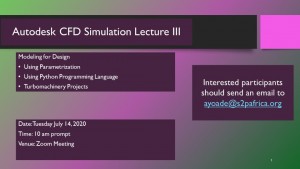Category Archives: Uncategorized
Python for Modeling, Machine Learning & Design Pre-Lecture Guide
Design Lecture Series: Python for Modeling, Machine Learning & Design
Zoom Lecture 009: Boundary Conditions III
[gview file=”http://oafak.com/wp-content/uploads/2020/08/WallHeating.zip”] [gview file=”http://oafak.com/wp-content/uploads/2020/08/Boundary-Conditions-III.pdf”]
Autodesk CFD Simulation Lecture Codes
Files Uploaded(7):
Python(5):-PulleyMaker; VoluteTemplate; VoluteTemplate01; Lab1; PipedClosedEnds
F3D(1): Furnace Wall v3
Mathematica(1): Furnace Wall 02
[gview file=”http://oafak.com/wp-content/uploads/2020/08/Furnace-Wall-v3.zip”] [gview file=”http://oafak.com/wp-content/uploads/2020/08/Furnace-Wall-02.zip”] [gview file=”http://oafak.com/wp-content/uploads/2020/08/PipeClosedEnds.zip”] [gview file=”http://oafak.com/wp-content/uploads/2020/08/Lab1.zip”] [gview file=”http://oafak.com/wp-content/uploads/2020/08/VoluteTemplate01.zip”] [gview file=”http://oafak.com/wp-content/uploads/2020/08/VoluteTemplate.zip”] [gview file=”http://oafak.com/wp-content/uploads/2020/08/PulleyMaker.zip”]
Zoom Lecture 008: Boundary Conditions
[gview file=”http://oafak.com/wp-content/uploads/2020/08/Boundary-Conditions.pdf”]
Zoom Lecture 007: Fusion 360 API Python Impeller
[gview file=”http://oafak.com/wp-content/uploads/2020/07/Fusion-360-API-Python-Impeller.pdf”]
Zoom Lecture 006: Fusion 360 API Python
[gview file=”http://oafak.com/wp-content/uploads/2020/07/Fusion-360-API-Python.pdf”]
Autodesk CFD Simulation Lecture III
Zoom Lecture 005: Autodesk CFD Simulation Lecture II
[gview file=”http://oafak.com/wp-content/uploads/2020/07/Autodesk-CFD-2019-Simulation-Lecture-2.pdf”]
